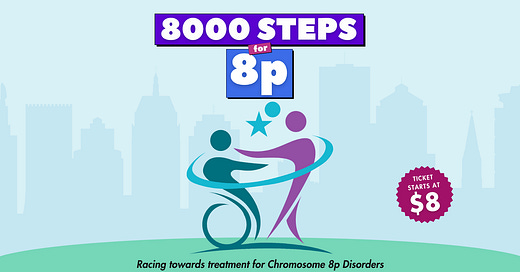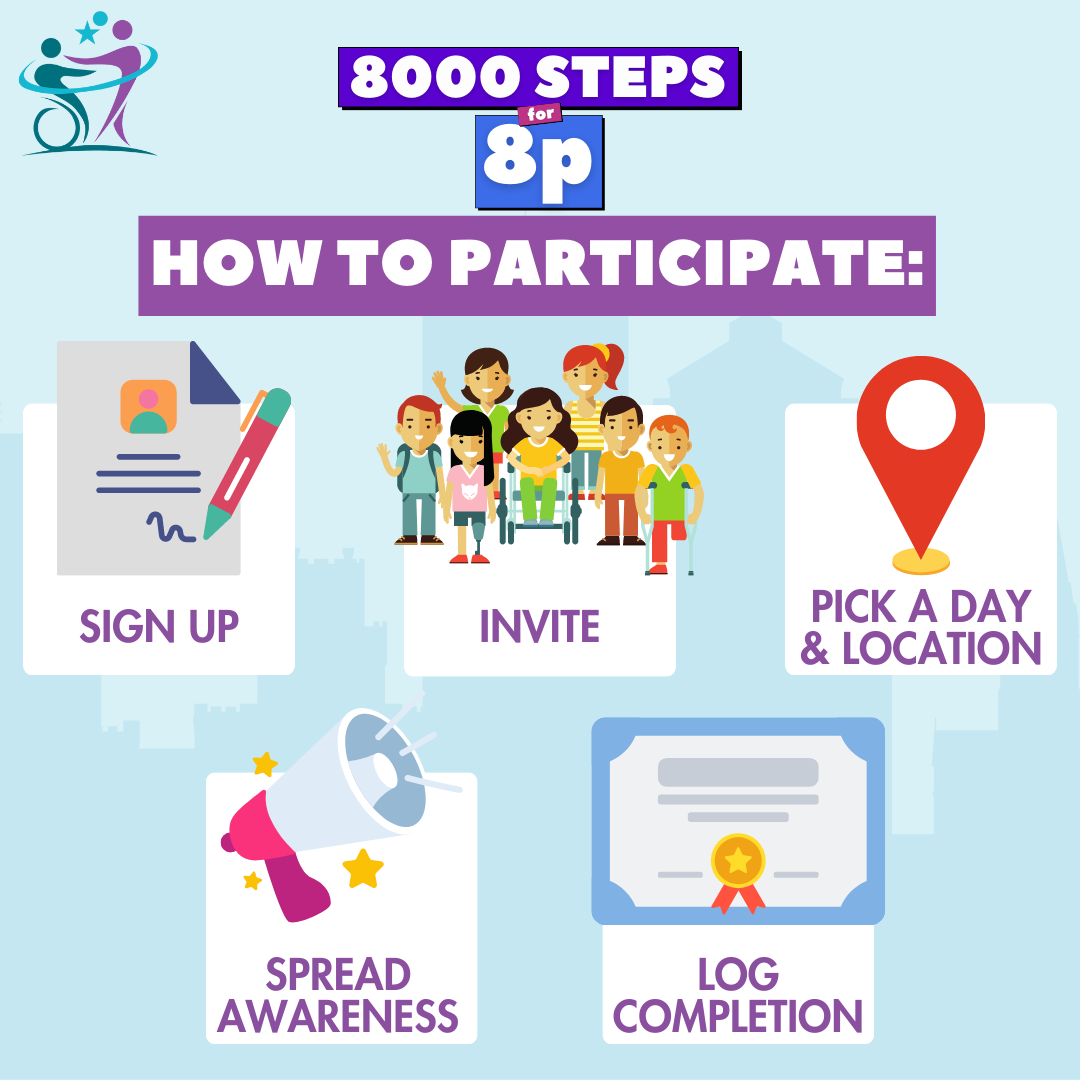Project 8p Research Newsletter - July 2023
💬 Research Question of the Month
We know that complex rearrangements of the short arm of chromosome 8 cause a multi-system disease, but is the damaged 8p chromosome itself toxic to cells the way a third copy (trisomy) of chromosome 21 or 18 is toxic to cells in Down and Edwards Syndrome, respectively?
Prof Jason Sheltzer's lab conclusively showed that patient-derived 8p cells (specifically, iPS cells) grown over many weeks in the lab do not spontaneously lose the damaged 8p chromosome. This result tells us that the damaged 8p chromosome is not acutely toxic. It also strongly suggests that not all cells are equally vulnerable to 8p rearrangements, and may explain why the brain is particularly sensitive to any changes to 8p.
Let us know what you think in the Comments section below!
🔬Research Highlight
This month’s Research Roundtable featured 8p researcher Dr. Jason Sheltzer from the Yale University School of Medicine. Dr. Sheltzer and his group are working on a project aimed at restoring normal chromosome copy number (disomy) in 8p iPS cells. The primary goal of this work is to create pairs of cell lines where the only difference between them is the 8p rearrangement (so-called “isogenic lines”). This will allow researchers to separate the impacts of the 8p CNV from those of the background genetic variation when it comes to studying the cellular biology of 8p or performing drug screens. In addition, this research will also help pave the way for chromosome therapies that can eventually be applied in vivo.
The research plan involves taking several parallel approaches to restoring disomy. The first approach they tested was to culture the cells over a long time period to see if the cells would spontaneously lose the affected copy of chromosome 8, as has been observed in cells with trisomy 21 or 18. However, after culturing for 80 days, the cells still contained the affected chromosome. Although it is not clear why this was the case, it points to potentially interesting differences between 8p and the trisomic syndromes.
Another ongoing approach is to treat the cells with an inhibitor of Mps1, a protein that is essential for chromosome alignment during mitosis, to promote loss of the affected chromosome 8. Other, more technically involved, approaches will include CRISPR-based editing techniques like ReDACT (recently developed by the Sheltzer lab) and KaryoCreate.
Although chromosome engineering still has a long way to go before reaching the clinic, experiments like these will provide important insights into 8p biology and begin to shed light on possible avenues for chromosome therapy.
Featured image above:
DNA copy number (vertical axis) across the genome (horizontal axis, binned by chromosome) derived from whole-genome DNA sequencing of an 8p hero (proband) with an 8p inversion/duplication deletion and their sex-matched parent. Copy number of 2 indicates a duplication and a copy number of 0.5 indicates a deletion, as seen in the yellow box for the 8p hero. Figure modified from Dr. Jason Sheltzer.
You can watch the meeting on Project 8p’s YouTube channel:
🔧Open Access Research Tools
This month, we are highlighting a few open access research tools that could be useful to the 8p research community.
CRISPRbrain - Data Commons for functional genomics screens in differentiated human cell types, including astrocytes, glutamatergic neurons, microglia, T-cells, pluripotent stem cells and hematopoietic stem cells. Explore, visualize, and compare data from (at present) 34 different screens.
CZ CELLxGENE - Visually explore and download over 800 standardized single-cell datasets representing 678 cell types.
CNV-ClinViewer - Tool for the clinical evaluation and visual exploration of user-supplied CNV coordinates. Developed by 8p Researcher Dr. Dennis Lal and his group in collaboration with the Broad Institute.
NDD-CNV Portal - Similar to the CNV-ClinViewer but focuses on a curated set of data pertaining to 8p, Ring14, and Dup15q. You can learn more from Dr. Lal’s Research Roundtable presentation last year.
National Brain Gene Registry - An NIH-funded collaboration led by researchers at Washington University in St. Louis, Boston Children’s Hospital and Harvard Medical School, and the University of North Carolina at Chapel Hill, aimed at identification of genes involved in neurodevelopment.
Do you know of an open access resource or tool that could be useful to the 8p community? Please share it in the comments or send us an email!
📄 Articles and Publications
Triplication of the interferon receptor locus contributes to hallmarks of Down syndrome in a mouse model. Waugh, K.A. et al. Nature Genetics. June 5th, 2023. https://www.nature.com/articles/s41588-023-01399-7 Open Access. Read the Research Briefing: https://www.nature.com/articles/s41588-023-01400-3
Previously, Dr. Espinosa’s group showed that interferon signaling is constitutively activated in trisomy 21 cells, likely due to triplication of the Interferon Receptor (INFR) gene cluster located on chromosome 21 (Sullivan et al. 2016). Here, they used CRISPR to restore the copy number of the INFR locus in a mouse model of Down Syndrome and showed that by doing so, many of the clinical features of Down Syndrome were ameliorated. Clinical trials studying the effects of drugs that inhibit interferon signaling in individuals with Down Syndrome are already in progress. While this research does not have direct implications for 8p, it demonstrates how CNV research can go from hypothesis all the way to the clinic.
Oncogene-like addiction to aneuploidy in human cancers. Girish, V. et al. Science. July 6th, 2023. https://www.science.org/doi/10.1126/science.adg4521
8p researcher Dr. Jason Sheltzer and his group describe a new molecular approach for studying aneuploidy called ReDACT (Restoring Disomy in Aneuploid cells using CRISPR Targeting). Here, they use this tool to show that cancer cells are dependent on certain aneuploidies for malignant growth. You can hear him describe this method in his June Research Roundtable presentation.
Let us know if you’ve read or published a paper or article recently that you think the 8p community should know about!
💜 Family Corner
Please join Project 8p for our second annual 8000 Steps for 8p event, an awareness and fundraising campaign; taking place the entire month of August 2023.
All funds raised support Project 8's mission to empower a unified community for chromosome 8p heroes for a meaningful life today while accelerating treatments for tomorrow.
📆 Upcoming Events
8p Research Roundtable, Dr. Glennis Logsdon, July 24th, 1:30 PM EST. Email whitney@perlara.com if you would like to attend.






